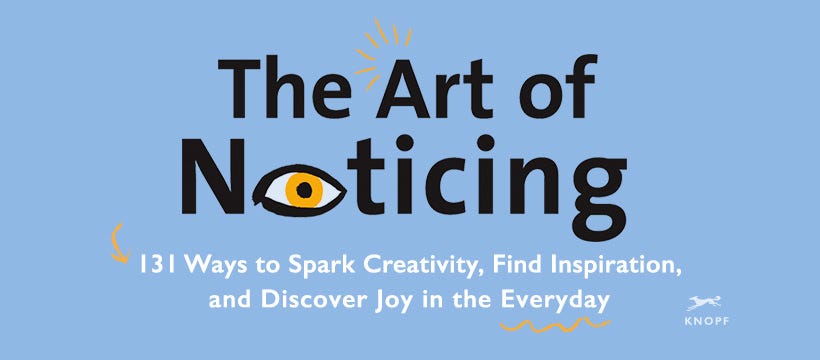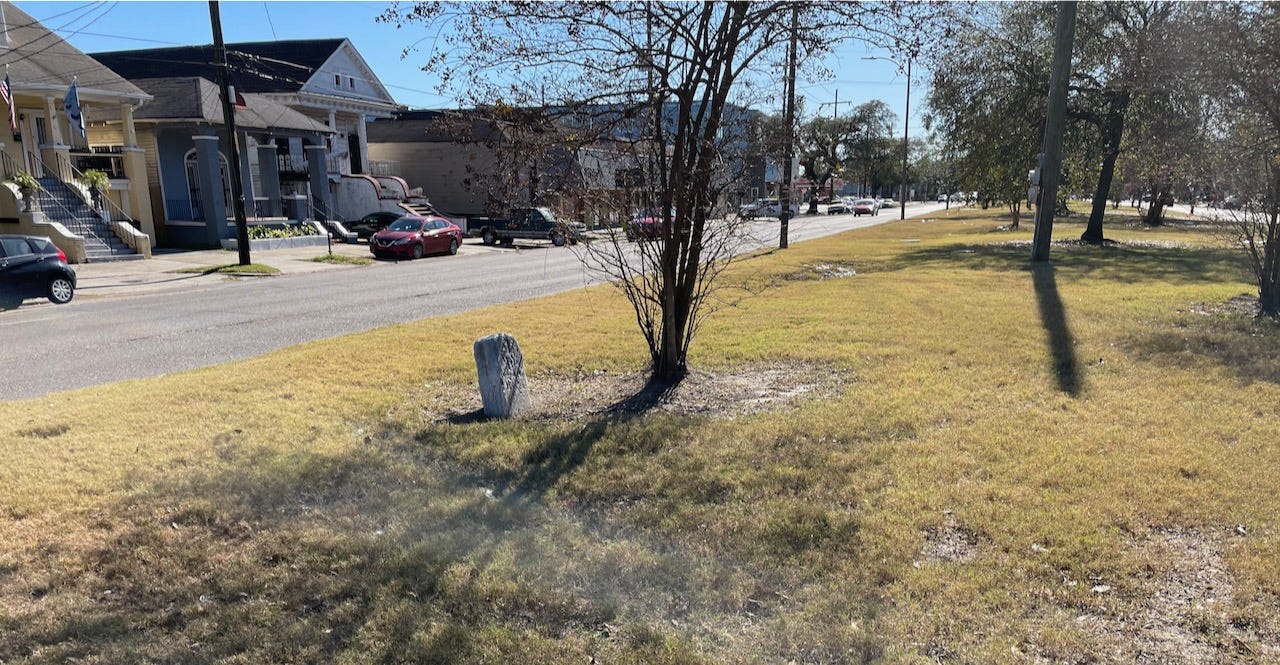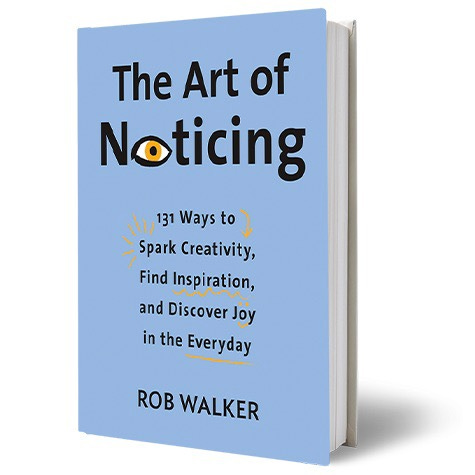TAoN No. 61: Hunting for Feelings
Missing words (finally) revisited. PLUS: A genuine milestone, and a new icebreaker
The Art of Noticing: 131 Ways to Spark Creativity, Find Inspiration, and Discover Joy In the Everyday offers exercises, prompts, provocations, games and things you can actually do to build attention muscles, stave off distraction, pick up on what everybody else overlooked, and experience the joy of noticing. Indiebound | Amazon | Barnes & Noble | Knopf. This newsletter offers related news and ideas and noteworthy projects that have come along since I finished the book. ****Subscribe or unsubscribe at: robwalker.substack.com.****
Hunt the Unnamed (Part 1)
Back in TAoN No. 58 I mused about “a dictionary of missing words” — a dictionary with no terms, just definitions. This was tied to a prompt (slightly modified here):
Pay attention to phenomena you encounter — sensations, states between states, feelings, slippery things — that could be named, but don’t seem to be.
I got a lot of feedback, and promised to follow up. This is (finally!) that follow-up. There were so many useful suggestions for further reading/inspiration:
Three readers pointed me to The Meaning of Liff, from Douglas Adams and John Lloyd. Reader Marion Boddy-Evans explains that the authors “took UK place names (of which there's an abundance and which just loiter on signs pointing at things) and assigned them to things English didn't have a word for.” More (with examples) here, and here. (Thanks also to Kostas Theoharis and Alex Hallatt.)
Reader Michael Palko pointed me to The Dictionary of Obscure Sorrows, a site and forthcoming book that “defines neologisms for emotions that do not have a descriptive term.” Creator John Koenig invents the words, but partly bases them on “research on etymologies and meanings of used prefixes, suffixes, and word roots.”
Coincidentally, reader Erin-Lee Laurence sent me a note citing a word that actually comes from Koenig: “Sonder — a word I never really knew existed, but certainly a feeling I had had in the past — the realization that every random stranger has their own unique story and is living a life as complex as your own.” (A very TAoN sentiment.) More here.
Also coincidentally, friend/hero of TAoN Mark Frauenfelder recently quoted The Dictionary of Obscure Sorrows in his kick-ass newsletter, The Magnet, citing the invented word kenopsia: “the eerie, forlorn atmosphere of a place that’s usually bustling with people but is now abandoned and quiet.” (Subscribe to The Magnet!)
On Twitter, @Anthropologal brought my attention to an AI-driven Scrabble variation called BLABRECS: “Real English words aren't allowed! Instead, you have to play nonsense words that sound like English to the AI. These nonsense words are called – you guessed it – BLABRECS.” (More here; it’s fun to try to invent nonsense words that get accepted.)
Reader Karla Strambini raised a point that I’d pondered but didn’t raise earlier: “Sometimes you can find wonderful words in other languages for concepts that aren't adequately named in English. My favorite is a French idiom: Esprit de l'escalier. It means a witty remark that occurs to you too late, literally on the way down the stairs. (From In Other Words by C.J. Moore.)”
Finally, I got several useful comments from astute reader Megan Arnold, including one directly relevant to words that exist in other languages: Check out this Brainpickings post about Lost in Translation: An Illustrated Catalog of Beautiful Untranslatable Words from Around the World from writer/illustrator Ella Frances Sanders. (Example: gurfa, an Arabic word that refers to “the amount of water that can be held in one hand.”) Great!
Megan also mentioned sniglets — defined as “any word that doesn't appear in the dictionary, but should” — a series of bits and books originating with Rich Hall starting back around 1980. I actually almost brought sniglets up in my earlier post; the Wikipedia entry includes even more word-invention precedents.
And last but not least, I love this final tip from Megan, a book called The Lost Words, from Robert Macfarlane, who, as this helpful post explains, “discovered that a new children's encyclopedia had discontinued some words to make way for others” and with illustrator Jackie Morris “sought to conjure and reclaim twenty of the ‘lost words.’” Lovely.
Phew! Okay, so big thanks to all — the smarter-than-me readers of this newsletter have basically generated an amazing syllabus for a whole course on missing words. And I love the connection to attention. So if you implement such a course, please let me know so TAoN readers can attend via Zoom ;)
But meanwhile….
Hunt the Unnamed (Part 2)
… as noted in my earlier post, what really interests me isn’t actually invented/inventing words, it’s the practice of noticing and attending to feelings or sensations or occurrences that lack a name. (Again: imagine a dictionary with only definitions, no terms.)
Another relevant prompt in The Art of Noticing is “hunt for a feeling.” This was inspired by Ernest Hemingway’s gripe that most people neither truly listen nor truly observe. He argued that a writer/artist/etc. “should be able to go into a room and when you come out know everything that you saw there and not only that. If that room gave you any feeling you should know exactly what it was that gave you that feeling.”
Setting aside Hemingway’s macho-challenge tone, what I find useful is the idea of working to pay attention not just to the conventional (what we see, what we hear) but also to the unnamed (the felt, the in-between). And I’m pleased to say that a half-dozen or so TAoN readers also sent me examples of exactly that. This is what I was hoping would happen!
So I’m going to introduce a new recurring feature to the newsletter, called (for now) Need A Word For … The first installment is just below.
And in a related development: I’m now encouraging responses (both reactions and new submissions) in the comments. You can still email me, but to be honest the email has been a little overwhelming lately. Which on one level is great and please keep it coming etc, but on another level makes me want to figure out how to make comments (which I have never previously encouraged) a viable and valuable addition to TAoN. Let me know what you think — in the comments!
Need A Word For …
Need A Word For … is an exercise in paying attention to phenomena you encounter — sensations, states between states, feelings, slippery things — that could be named, but don’t seem to be. More here. This week’s submission is from Nick Kinling:
When I'm walking on a straight path and see people ahead of me, there is a moment when I can't tell if they are walking toward or away from me. I'd like to name this brief moment when I am utterly unsure of their direction.
I totally know this sensation/phenomenon! Thanks, Nick!
If you have a response (maybe there IS a word for this?), leave it in the comments. Or submit your own Need A Word For…, in the comments or via email.
My Modest Quest: A Real Milestone
Last issue I endorsed the “modest quest.” And not long after, I made one myself.
My inspiration was this article about the history and significance of Elysian Fields, a thoroughfare here in New Orleans that runs five miles from Lake Pontchartrain to the Mississippi River, and used to link those destinations via the Pontchartrain Railroad. That train ceased operation in the 1930s, and the tracks were removed by the 1950s. But one trace remains. The article explains:
“On the neutral ground by North Roman [Street’s intersection with Elysian Fields] may be found a stone slab etched with the Roman numeral ‘I,’ meaning one mile from the river. This is the last of the five milestones along the Pontchartrain's tracks, and now stands as a sort of tombstone” for the departed rail line.
That’s right: an actual milestone.
Ever since I read this article back in 2018 I’ve wanted to go check this out. It’s about a 30-minute bike ride from where I live, and on a recent weekend I finally did it. That’s my first modest quest of 2021:
Okay, okay, it’s not much to look at. But, c’mon — a real milestone! Totally worth it!
Icebreaker Of The Week
Noticing is about other people, too. The Icebreaker series aims to help with that. There’s a central collection spot for all the icebreakers to date, here. || There’s also an Icebreaker Slack app, here. (Back story on that here.)
This week’s icebreaker comes from reader Karla Strambini:
What is your favorite compliment of all the compliments you've ever received?
Karla (yes, the same Karla cited in the missing words roundup above!), adds: “It's too easy to hoard hurtful insults, so as an antidote, I try to collect compliments instead. (I'm thinking of turning them into labels & stitching them into my clothes.)” I love it. And what a nice note to start the new year!
I’m still working through the backlog of icebreaker submissions, but as always, I want more:
Send your favorite icebreaker (whether you made it up or found it elsewhere) to consumed@robwalker.net
In Other News
Thanks to the Dense Discovery newsletter for the nice shout-out to the Art of Noticing book and “unlearning our distraction habits.” Check out Dense Discovery here.
The NYF Advertising Awards has been resurfacing TAoN nuggets in their weekly newsletter. Their annual competition (with student categories) is currently open for entries; more on that and their newsletter here, or reach out to the competition director Scott Rose at Srose@newyorkfestivals.com.
Dan Ariely on the upside of not taking pictures.
On the subject of the Worthy Binge: Is it worth reading War and Peace?
Another Worthy Binge note, to those of you interested in my PT 50 endeavor: I did some cursory extra research to roughly organize the entries on that list by year of composition. A link is here. (I make zero promises for accuracy.) I’m listening by going oldest composition first, then newest, then second oldest, etc. Reminder: Find reader-made PT 50 Spotify playlists here — though they are obviously not organized by year of composition.
What It’s Like to Learn to Sing in Your Fifties. I’m very excited about Tom Vanderbilt’s new book, Beginners: The Joy and Transformative Power of Lifelong Learning. More on that soon.
Reader Jenny Slade responded to the recent bit from the reader who collects sightings of “mystical items” that suggest interesting back stories: Turns out there's a hashtag for such items on Instagram, #alleyshrimp. Reader Joe Regan said so, too, adding: “the strict definition by the originator @lakeicychill is ‘photos of things where they don't belong.’” Both pointed to a Swissmiss roundup of examples here, from a while back. Super fun, thanks!
Draw The Year Ahead. “An illustrated More/Less list is a relaxed version of the classic New Year’s resolution list.” (NYT link)
Please follow me on Medium at rwalker.medium.com, and check out Marker, the Medium business publication I work for.
Okay that’s it! Next issue in two weeks.
As always, I value your feedback (suggestions, critiques, positive reinforcement, constructive insults, etc.), as well as your tips or stories or personal noticing rituals, and your icebreakers: consumed@robwalker.net. Or use the comments!
Thanks for reading …
rw
P.S. If you enjoyed this, share it and/or sign up here: robwalker.substack.com.
Twitter | Medium | RobWalker.net | NB: I use Amazon Affiliate links
All this by Rob Walker PO Box 171, 748 Mehle St., Arabi LA 70032
Unsubscribe Here if you wish.






ForeWarmed?
I think the nicest copliment I ever received was given to me by an old black gentleman. I had stopped my car in the entrance of the parking garage in downtown Philadelphia to rescue a baby pigeon. He was walking down the on ramp to do the same thing. He looked at me and said, "You have God in you." He smiled and walked back up the ramp. That was more than 30 years ago but I can still hear his voice and see his face, especially his eyes. More than likely, he was God.